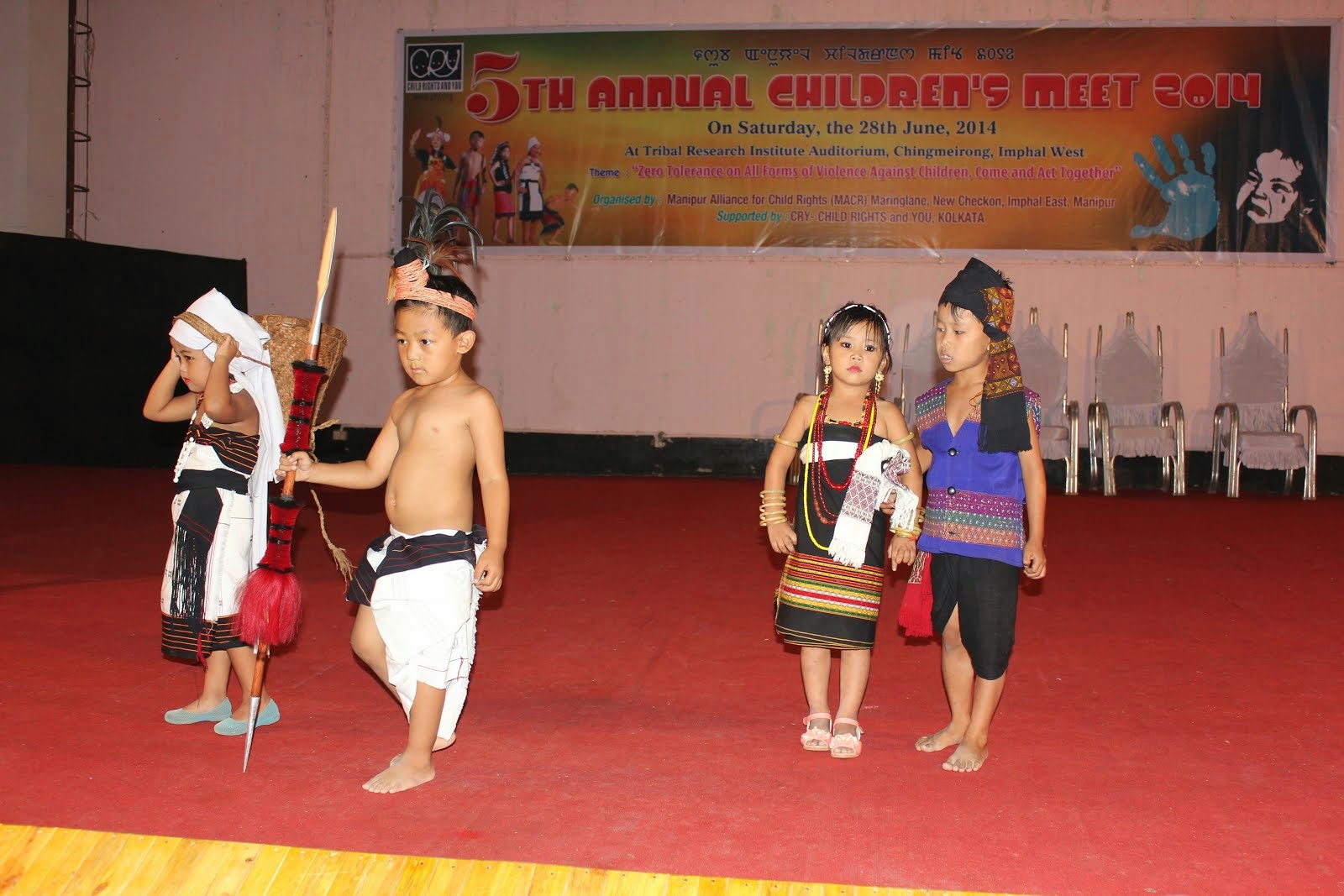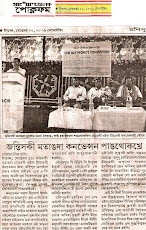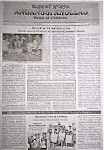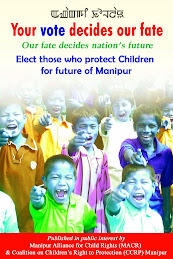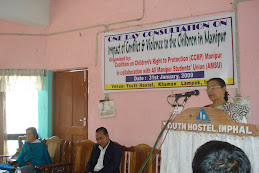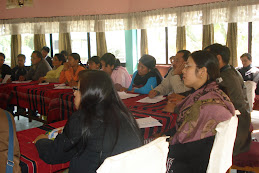IMPHAL, Sep 29: Coalition on Children’s Rights for Protection (CCRP), Mani-pur has appealed to all the individuals and organisa-tions concerned to respect the dignity of the children staying in children homes and not to bring them out under media glare at the time of asking donations.Addressing a press conference in this connection at Manipur Press Club here today, State co-ordinator of children’s rights body, K Pradipkumar, pointed out that in accordance with the provisions under Article-III of the Convention on the Rights of the Child, any organisation or individual concerned, who intend to take up developmental related programmes for the children should first of all understand that the programmes should be in the interest of the children concerned and it should not affect the dignity of the children.However, it has been observed in Manipur that the children in children homes are being forced to come out under media glare to sing, dance, take part in stage programmes in the name of charity show or fund drive as well as in film shooting. All these activities are against the interest of the children, apart from discouraging them and creating a false impression in their minds that they can survive without the donation of others, Pradipkumar said.So, even if any individual or organisation want to donate something for the children, they should not be exposed to the media glare, he said.Convenor of the children’s rights body, S Sarju said children of children homes should not be forced to take part in protest rally, sit-in-protest or any other public movements. Moreover, they should not be imparted vocational training in unorganised sectors or adopted. Along with these measures, entry of people inside the campus of children homes and consumption of liquor, drugs and tobacco products should be stopped, she added.Member of the Core Group H Rashi stated that all the points that CCRP highlighted should be strictly observed in all the existing children homes in Manipur.She further pointed out that words like orphan or relinquish should not be used against the children staying in children homes.Another Core Group member Sanaton said that the Government should ensure adequate protection and care for the children in children homes and increase their daily food allowance. This should also be reflected in the budget allocation of the State.
Tuesday, September 29, 2009
Call to shield kids from media glare
IMPHAL, Sep 29: Coalition on Children’s Rights for Protection (CCRP), Mani-pur has appealed to all the individuals and organisa-tions concerned to respect the dignity of the children staying in children homes and not to bring them out under media glare at the time of asking donations.Addressing a press conference in this connection at Manipur Press Club here today, State co-ordinator of children’s rights body, K Pradipkumar, pointed out that in accordance with the provisions under Article-III of the Convention on the Rights of the Child, any organisation or individual concerned, who intend to take up developmental related programmes for the children should first of all understand that the programmes should be in the interest of the children concerned and it should not affect the dignity of the children.However, it has been observed in Manipur that the children in children homes are being forced to come out under media glare to sing, dance, take part in stage programmes in the name of charity show or fund drive as well as in film shooting. All these activities are against the interest of the children, apart from discouraging them and creating a false impression in their minds that they can survive without the donation of others, Pradipkumar said.So, even if any individual or organisation want to donate something for the children, they should not be exposed to the media glare, he said.Convenor of the children’s rights body, S Sarju said children of children homes should not be forced to take part in protest rally, sit-in-protest or any other public movements. Moreover, they should not be imparted vocational training in unorganised sectors or adopted. Along with these measures, entry of people inside the campus of children homes and consumption of liquor, drugs and tobacco products should be stopped, she added.Member of the Core Group H Rashi stated that all the points that CCRP highlighted should be strictly observed in all the existing children homes in Manipur.She further pointed out that words like orphan or relinquish should not be used against the children staying in children homes.Another Core Group member Sanaton said that the Government should ensure adequate protection and care for the children in children homes and increase their daily food allowance. This should also be reflected in the budget allocation of the State.
Dont use Children Home for propaganda mileage’
Imphal, Sept 29: The Manipur Mahila Kalyan Samiti, Dewlaland, Imphal has appealed to all the visitors and donors not to come along with media and also not published photographs or broadcast video clips for these have an adverse impact on the sentiments of children staying at the special home.In this regard a press meet was held this evening at Manipur Press Club was organized by Coalition of Children’s Rights and Protection (CCRP), Manipur in which the state co-ordinator of the CCRP Keisham Pradeepkumar noted that donors are requested not to directly distribute food items to the children and food items should be served to the children of MMKS Children Home by the members and staff only.He further noted that the donors should not invite the children of MMKS Children Home for meal outside the Children Home even in the name of religious observation and individuals and donors should also not force the MMKS Children Home committee to accept donation either in cash or in kind which contradicts to the home’s rules and regulations.The member of CCRP S.Sarju also noted that using of children in rallies, dharnas, sit-in-protests as part of people’s movement should be avoided and donors and visitors should not pressurise children for presentation of extra curricular activities like song, recitation, acting, monologue, etc to entertain prohibited.She also noted that exposure of the children of MMKS Children Home in charity shows, donation, fund drive, film shooting, etc. even in the name of nurturing them are strictly prohibited.She requested all concerned not to ask for employment of the children in unorganized sectors either in the name of imparting vocational training or adoption.Persons with arms and ammunitions are strictly prohibited from entering the children home as well as using of all forms of intoxicants (liquor, drugs, tobacco products, etc.) are prohibited inside the children home campus, she said.
Sunday, September 27, 2009
Education in Manipur, No toilets for 23 schools
‘Books must but extra curricular activities vital’
Education Report released by MACR
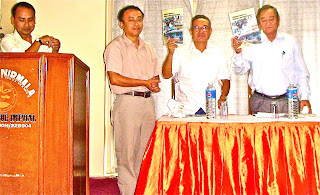
Manipur Alliance for Child Rights organize a workshop on Education on the 27th of September 2009 at Hotel Nirmala at 11:00 am. A research report on ‘Situational analysis of education of children in Government School’ and a status report on primary school education in Manipur was also released.
Ex – Principle DM college of Teachers Education, Ex – Executive member Indian association of Teachers’ educator and presently member of Eastern Regional committee - National council for Teachers education (NCTE) graced the function as Chief Guest & President respectively.
The finding of the research study concluded that there is an urgent need to strengthen the existing Government Schools as the present condition of the government schools in the sample district is deteriorating. The present condition might be due to improper planning of the State Education Department.
The sample schools’ infrastructure were not satisfactory. There is a big discrepancy of 276 as the number of 203 rooms in working condition in the data and the estimated required rooms of the schools 479. Majority of rooms were in need of major repairing. There are 54% of toiletry facility which out of, 74.7% in bad condition but conditionally used. The remaining items like fencing, drinking water etc are in pathetic condition.
On the day of data collection, the students attendance and teachers strength of the schools’ ratio were 1 teacher : 3 students. The attendance of students in the schools were very less in compared with the number of students enrollment in the register. The facility of mid day meal and SSA in the schools were not proportionate and managed.
86.78 % of student were appeared examination and 14.66% of student were drop out. There were not found any follow up action from the schools.
Majority of the students did not feel satisfied about the infrastructures, academic quality and extra curricular activities of the schools.
Parents and Gurdians were also not satisfied about the schools’ management system in relation with all the schools activities. Most of them wanted to shift their children to a better private schools but it was out of their capacity since those are just one day bread earners.
The reasons of the deteriorating government schools might be no education policy of state, the present existing school code is not functioning well. The ZEO’s monitoring and evaluation system might not be transparent and sincere. Education related departments like Social Welfare, Tribal Welfare and Education Departments were not found proper coordination and linkages. There is not seen any political commitment and initiative for education policy of the state.
Saturday, September 26, 2009
Asian Harm Reduction Network (AHRN) highlights 23/7
Under Siege: Manipur, India
Manipur is reeling from recent outbreaks of violence orchestrated by what has been described as seventeen separatist rebel groups. This unrest has grown out of the now famous 'fake encounters' incident in which innocent people were killed, allegedly by government forces who claimed that they were terrorists. Since the first of these killings on 23 July there have been a number of protests and blockades which have resulted in government imposed curfews, therefore disrupting the lives of large numbers of the population.
These restrictions limit the movement of people and have had a particular impact for those people on medication and in therapeutic programs. This has especially affected those on Anti Retroviral Treatment (ART), Oral Substitution Therapy (OST) and Directly Observed Treatment (DOT).
In addition to the normal poor provision of essential services, the closures of market places, offices and schools have crippled the State and seriously disrupted everyday life. Patients who require daily doses of medicine are amongst those worst affected. However those on OST and DOT are facing additional suffering because their medicines and therapy are provided on a daily basis with strict adherence essential. These patients, whose movements are restricted by curfews and bandhs [blockades], are at additional risk.
When this writer spoke with a few OST patients, they expressed anguish about the harassment they receive on the road while travelling to collect their daily medicine. This continued even after they explained their medical condition and purpose of travel. Under these circumstances withdrawal symptoms are inevitable and add to the suffering of an already vulnerable group of people.
The same can be said of clients on ART. Fewer people in this category are affected because their medication is dispensed on a monthly basis. However those patients who live on the outskirts of the city or in the surrounding rural areas face additional problems due to the disruption of an already poor transportation system.
When society begins to break down as in Manipur, everyone is affected. Drug users who could expect to eke out a living on a small daily wage suddenly see their source of income disappear. Students find that they cannot attend school and thus fail to meet their curriculum requirements. There are shortages in essential commodities and as a consequence the prices of fuel and foodstuffs begin to rise. People face long queues under the heat of the sun or in the rain to withdraw money from the banks or to purchase fuel.
Over the years the population of Manipur has been coerced into living a life of uncertainties. They never know when the next bomb or bullet will come their way. Living a safe and happy life is everyone's dream yet leading a normal life in Manipur is far from reality in the foreseeable future.
Namaram Kishalaya (Dodo)
Gen Secy, NEIHRN and a KC with HDN
24-09-2009
Note: with editorial support from Ian Franklin
Asian Harm Reduction Network,
PO Box 18 Chiangmai University,
Chiangmai, 50202, THAILAND
AHRN Disclaimer
The Asian Harm Reduction Network (AHRN) publicizes and circulates reproduced documents to its users. AHRN does not necessarily endorse or condone the use of certain words or phrases contained within these documents. In the spirit of proper citation, the AHRN news digest and website may therefore contain certain terminology that some members might find offensive or counterproductive. We apologize for such language and we encourage you to take up the issue with the initial publisher or author. Furthermore, AHRN is not in a position to verify the veracity of each article's content. AHRN encourages you to send in your comments regarding the content of articles and AHRN will be pleased to communicate those comments to all our readers. If you find inaccuracies, please point them out to the AHRN team and we will issue corrections promptly.
The contents of this document and any attachments may be confidential and legally privileged. All information herein provided is for the sole use of AHRN. Under no circumstances will this information be distributed or made available to third parties. We recognize the right to privacy and therefore consider our subscriber's information confidential and legally privileged.
Sunday, September 20, 2009
Imphal, September 19: A one-day discussion on the impact given to the children of today by the chaotic and unstable situation prevailing in the state for long time was held today at Yurembam Awang Leikai under the aegis of the Manipur Alien For Child Rights (MACR).
The discussion session was initiated with president of the Youth Development Club L Achouba, social worker Ch Ibopishak and M Kunjakishore on the platform.
Taking part in the discussion, member secretary, Child Welfare Committee, K Pradipkumar said like in other part of the globe, in the state too people are facing armed conflict for the last around 20 years. Picking up of members of civil society bodies on the alleged link with outlaw outfits is also occurred in other parts of the globe where there is armed conflict.
But, one should remember that people are the victory at all instances. There should come an end to the ongoing chaotic and violent incidents in the state, she observed. In the last 20 years of armed conflict, more than 5000 people have been killed by the security forces in alleged fake encounters. Out of this around 3000 were killed in the last around seven to eight years. As a result of the killing, more than 5000 women be been widowed while around 10, 000 children are suffering as result of killing of their fathers, she added.
Montu Ahanthem who also participated in the discussion observed that so long as elders are depriving from their rights, children will not able to get their rights. to get rightful rights by the children of HIV victims is a major concern.
Saturday, September 19, 2009
One Day Peoples' Convention of Imphal West District

Tuesday, September 15, 2009
How Small Children are paying the cost of prolonged conflict situation in the State of Manipur
On 13th September, 2009 at around 6 am there was heavy firing in between the security personnel and the UG, the villagers took shelter in safe place, In a bid to differentiate between UG cadres and the villagers, any villager going for work in far off places was given a token by the security personnel, without token, no villager can venture outside. State Government has not taken any initiative to any developmental work in the region only some medicine has been distributed by the security personnel.
At the time of illness, the patient should be taken all the way to Imphal which is 120 kms away. There is one primary health centre at Sajik Tampak but there is no doctor, There is no safe drinking water facility in the whole area. The villagers have been using water either from river or water-holes.
Child Rights workshop calls for rule of law
Wednesday, September 9, 2009
AMSU announces indefinite class boycott from today
Imphal, September 08: The All Manipur Student’s Union today announced class boycott infinitely starting from tomorrow (September 9) to all schools stating that there is no value of study in the prevailing lawless situation where there no life security.
AMSU took the decision to boycott classes indefinitely thinking that it would be batter to ensure life security first in the state where there is no security for the civil populace as dead is the last, a statement issued by the AMSU signed by its general secretary, Md Alamgir expressed.
The boycott is part of the solidarity to the people agitation demanding resignation of chief minister O Ibobi, befitting punishment to the police commando personnel involved in the July 23, shooting incident, total elimination of state terrorism, repeal of AFSPA and unconditional release of the volunteers of Apunba Lup spearheading the agitations.
The class boycott stir will continue till the demands are fulfilled, the statement said citing that when there is no security for life and state actors committed in extra judicial killing, it is meaningless to go to school for study.
The prevailing situation where people are living under a government enforcing “marital law” and “dictatorship”, where people are killing by the state actors and no one could tell when will die, there is no meaning of remaining in the class. What is the value of education when people are killing whenever they like, the statement asked.
AMSU well understand the loss to be suffered by the class boycott and also the impact of bandh, blockade etc. to the people. But considering for the security of the students in particular and for the people of the state in general, the decision has been taken, said the statement appealing the parents, guardians and other to bear with the body and extend support.
In the state, in the last around 30 years, spree of killing may be by the underground or security forces are continue unchecked. Thousands of people lost their life while many more had been hurt. Government forces have killed so many people after picked up, many picked up by them were missing apart from raping, molesting many women.
The state following democracy is not like having no people government but rule by dictator by in forcing martial law. Every body who thing of the land know what the state of condition prevailing in the state.
Since the beginning of the regime of the Ibobi as chief minister of the state in 2002, in the name of counter insurgency operation, people are killing in fake encounter without a day break. The reports published in the print and electronic media had evidenced how many people have lost their life in the hand of the security forces, the statement said.
Saturday, September 5, 2009

Online edition of India's National Newspaper
Sunday, Aug 30, 2009
Skewed coverage
SEVANTI NINAN| Manipur, a State which sees much more daily violence than Kashmir, hardly figures in the mainstream media. |
Once in four or five years a stunning incident hits home and brings Manipur back into national focus.

In Focus: Manipuri students protesting State violence in New Delhi.
Manipur is in the news. That is a miracle in itself. A State accustomed to steady national amnesia is watching bemused as the media descends. CNN IBN is here, New York Times is here, says a local editor. NDTV and Times Now have come and gone, says a local reporter.
Manipur is in the news and its killing fields are feeling the impact. A State that reported 225 encounter killings this year until Tehelka hit the stands on July 31 has seen hardly any killings by the State in the three weeks since. The magazine ran an unnamed photographer’s sequence of 12 shots which chronicle the straight killing of a former insurgent by police commandos. No encounter, just a plain, point blank killing in a marketplace. Given Manipur’s status on India’s news radar it did not become a cover story even then, not until a subsequent issue. But it suddenly brought home to the country and the world the chilling realities in the border State that gets the least media attention.
A Congress government runs this State and no eyebrows are raised at the Centre when the Chief Minister said in the Assembly on the day of this killing, “I don’t want to kill but what is the option.” (A translation of his statement made in Meitei.) A statement he has subsequently denied, though it was made in the House. But the photographs punctured the inertia. The Home Secretary at the Centre has come visiting since, even though Mr. Chidambaram, who hot-footed it to Kashmir when the Shopian rapes engulfed the Chief Minister there, has not.
The photos got national exposure because the photographer who shot them could not get them published in the Imphal newspaper he worked for. They were sent to Assam and given to Teresa Rehman, Tehelka’s correspondent in Guwahati. Once in four or five years a stunning incident hits home and brings Manipur back into national focus. The last time was in 2004 when a young woman called Manorama was killed and raped after the Assam Rifles picked her up, and anguished mothers in the State chose to demonstrate naked. Those pictures seared the national consciousness.
Off the media mapManipur has the killings, Kashmir gets the coverage. For reasons difficult to fathom, it fell off the media map. Despite a level of daily violence which Kashmir has not now seen for some years, Manipur does not make news. So there is no national outrage.
Over a 60-day period earlier this year (May 15 to July 15) the media in the State reported 102 civilian casualties including deaths, 72 deaths of militants including 37 “encounters”, and five of men belonging to the State forces. Over the same period, this is what got picked up by the media outside the State: The Telegraph, the paper which has a Northeast edition coming out of Guwahati, found space in its Kolkata edition for six stories. Of the four on Manipur, three related to the killing of four Bengali migrants, the fourth from New Delhi was about a Manipuri actress nabbed with a militant. In the same paper, Kashmir rated nine stories and two editorials.
DNA in Mumbai found space for 25 stories from Kashmir, three from Assam, none from Manipur. The Delhi edition of Times of India which also has an edition in Guwahati, found space for two stories from New Delhi on Manipur, one of which was on the nabbed militant above. What of the 70-plus conflict-related deaths in two months? They did not make news. And Kashmir? It rated 48 stories, half of them on the rape-murders in Shopian.
The Delhi editions of The Indian Express and The Hindu over this period had around 60 stories each from Kashmir, eight and 11 respectively from Imphal, and each of them reported three militant-related deaths in this benighted State. Kashmir inevitably merited an editorial or two over this period, none of the seven States which make up the Northeast, did.
What was the level of violence in Kashmir over the same period? Civilians killed 18, including the rape and murder victims in Shopian, militants killed seven, troopers, four.
And what of television? “If a story breaks here NDTV will have a one-minute story,” says Imphal-based journalist Ahanthem Chitra. “If something happens in Kashmir there are panel discussions. Manipur, Nagaland, no panel discussions. It is headline news for one day then it dies out.”
What makes a newspaper national, asks Pradip Phanjoubam, the editor of the Imphal Free Press. “Should not coverage be a criteria if papers are classified national by DAVP (Directorate of Advertising and Visual Publicity) and RNI (Registrar of Newspapers for India)? Should they not have to give space to all parts of the country?”
*
What is the shape of the local media in a poor cousin State riddled with insurgency? One of stoicism coupled with genteel penury. Salaries for experienced journalists seldom cross Rs. 5,000 a month, editors’ salaries range between 10,000 and 30,000 a month, mostly at the lower end. Appointment letters are a rarity though the All Manipur Working Journalists Union has now begun to insist on them. How do they manage? They work at more than one job and live with their families.
The local economy generates no advertising for a newspaper; corporate advertisers prefer to use outdoor media. There are other challenges. Newsprint has to be transported via Assam by train, then by road. You have to pay tax to the NSCN-IM, Rs. 7,000 per truck. It costs Rs. 10,000 per tonne more, by the time it arrives.
Increased aggressionThe killings continue with impunity because the State feels no pressure at all from a brave and persistent local media. As it keeps up coverage of the protests following the Tehelka expose, State aggression has stepped up, says the editor of Ireibak, Irengbam Arun. Last week, police commandos lobbed a smoke bomb towards the journalists covering a sit-in-protest in Imphal East. Elsewhere, commandos stopped a vehicle carrying journalists who were coming back after covering protests and questioned them at gunpoint. He adds that some months ago, in an incident possibly unprecedented elsewhere in the country, the Director General of Police summoned editors and asked them to reveal which reporters had done a story on urea smuggling which showed complicity of the police.
Keeping journalism going in Manipur then, is a daily challenge.
Printer friendly page
Send this article to Friends by E-Mail
Manipur rages over 'fake kills'
Imphal: A pregnant woman and a young man were killed in Manipur’s capital Imphal recently in what the state police termed an encounter.
However, photographs published by news magazine Tehelka show that the man, Chungkham Sanjit, was unarmed when the police allegedly killed him.
Soon after the issue hit stands, violent protests rocked the insurgency-hit state and citizens protested violently against what they called a fake encounter.
Hundreds of protestors took to streets demanding stringent action against the police commandoes.
Manipur was put under curfew and capital Imphal shut down for the third consecutive day on Wednesday. Three women attempted to strip in protest in front of the Raj Bhavan and life came to a standstill across the state.
A local group called Apunba Lup is spearheading the campaign for justice for Sanjit.
They are demanding the resignation of Chief Minister Ibobi Singh, an explanation for the alleged murders, and the repeal of the stringent Armed Force Special Powers Act.
"After the Tehelka expose now every citizen of Manipur comes to realize that people were killed in encounters in the past also, even though they were nowhere in the scene and we want justice for it,” said Satyajit Singh, a protestor.
More than 20,000 people have been killed in decades of insurgency in Manipur. Nine years ago, the now iconic Irom Sharmila went on a fast demanding the repeal of AFSPA.
Her battle is still on and the Tehelka photographs reaffirm fears that other shootings in Manipur could also be stage-managed.


